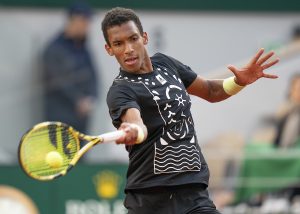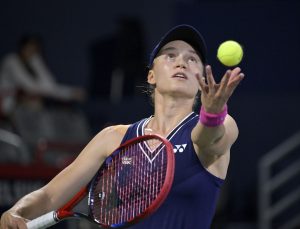Steve Johnson was one of the several American players who advanced into the second round at the US Open on the opening day’s play on Monday, August 27th. The 28-year-old held firm control over the match proceedings to beat his opponent, Denis Istomin, in straight sets in two hours and 10 minutes. However, even as the day belonged to Johnson, it still remained a by-play in the bigger narrative which featured Istomin at the forefront.
To begin with, here’s some context.
While many in tennisdom were preparing for the US Open by either taking a respite after Cincinnati or playing in one of the few tournaments squeezed in the week immediately prior, Istomin was in Indonesia representing his country in the Asian Games in Palembang.
It accounted for a noble cause, making a declaration of national-level participation over Tour-tournament preferences. It was also a decision that seemed to work well for the Uzbek as he went to win the men’s singles event to claim the gold medal on Saturday, 25th August and thereby book his place in the 2020 Tokyo Olympics through the allotted quota for the Asian Games’ champion.
Relatively speaking, this seemed like the easiest part for Istomin to do. The toughest, on the other hand, was making it back westwards to the United States in time to mark his attendance at Flushing Meadows. Which, then, leads us back to the aforementioned match and its eventual outcome.
On the face of it, Istomin’s scheduling looks to be a harsh bargain to have been entered into.
But on a larger scale, it’s not just about Istomin’s scheduling vis-à-vis the Asian Games. But it’s also about the tournament’s value-addition to the sport beyond the scope of medals and Olympic-quota spots. By extension, then, it’s also about the Olympics and the extent of its contribution to tennis.
In Palembang, tennis as a discipline had a participating number of around 160 athletes. Impressive as this number was, there were also several big names who were visible through their decision to give the event a miss. These included the likes of Kei Nishikori, Hyeon Chung, Naomi Osak,a and even Mikhail Kukushkin and Yulia Putintseva. The event also saw the 2014 Asian Games champion, Yoshihito Nishioka, also give the 2018 edition a miss, while the top-ranked Indian singles player and one of the favorites, Yuki Bhambril also decided to forgo the event with an idea of focusing on the US Open.
What puts these players’ absences into context is the fact that tennis has been a part of the Asian Games since 1958, with only the 1970 edition of the Games not featuring tennis in its itinerary. Across these years, then, there have been several well-known names who have made it to the podium even as they have been successful on the professional Tour. As such, the players not receiving ranking points for their efforts in these Games is quite bemusing. Even more so, when considering that the professional Tour’s competitiveness sees players vie to boost their rankings to make the most from their career.
This anachronism can, then, be correlated with the Olympics. While the Olympics for four editions (between 2000-2012) offered ranking points, the lack thereof at the 2016 Rio Games hit hard enough. With the Davis Cup, too, halting its practice of offering ranking points, it felt as though the sheen of two of the most singular events of the sport were wiped off in one emphatic stroke.
Not that there was any hindrance to the players’ participating in the 2016 Rio Games and most likely, the 2020 Tokyo Games will also feature the biggest tennis-playing names. Moreover, with the four-year Olympic cycle invoking nostalgia-driven pride among the playing contingent, it’s hard to imagine that many players would want to skip the Olympics voluntarily. Which in a way, then, aligns well with the 76th ranked Istomin choosing to play the Asian Games so as to leave nothing to chance about his qualification to represent his country for an event that is almost two years away.
But what about Istomin and the rest of the players making up the 64-man draw in actuality in 2020 in Tokyo? With no ranking points being offered, playing the Olympics is nothing beyond a dead-end of greatly-hyped tokenism.
And, this is nowhere more visible than in the disapproval generated by the change of the Davis Cup format recently. As cacophonous as everyone’s frustration was towards the initiative of change, the quietness surrounding the status quo of the team-based cyclical events is just as disquieting.






